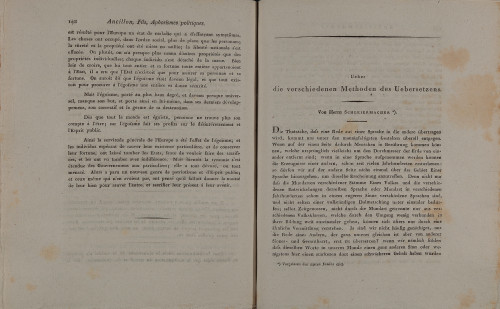Translation played an important role in Romanticism. In addition to the plays by William Shakespeare, above all works of early Italian, Spanish, and Portuguese literature were translated into German. The Romantics also came to appreciate Oriental poetry, and their interest in the Middle Ages drew their attention to the Minnesang and the Song of the Nibelungs. The extensive translation activities served to elevate the status of the translator, who was now equated with the author of the original. Already Novalis observed that, “in the end, all poetry is translation”. And in his novel Godwi, Clemens Brentano even claims: “The Romantic itself is a translation.”
Through his friendship with Friedrich Schlegel, the theologian Friedrich Schleiermacher of Berlin had close ties to the early Romanticists in Jena. Ancient philology was one of his many interests. Schlegel proposed embarking on a joint translation of the works of the Greek philosopher Plato. Ultimately it was Schleiermacher who carried out the job: between 1804 and 1828 he translated nearly all of the ancient Greek thinker’s works. When he gave his lecture On the Different Methods of Translation at the Berlin Academy of Sciences in July 1813, he accordingly had substantial practical experience under his belt. The lecture came out in print in 1816 and is still considered a key text on translation theory today. In it, Schleiermacher’s concern is with texts on art and science in which thought and expression are inseparably intertwined. He discusses the consequences of historical and cultural influences on human thought for communication. In this context, he emphatically advocates retaining the unique and unusual qualities of the original. This compels the reader to engage with the unfamiliar. The benefit for the reading public is precisely in the broadening of one’s horizon through the encounter with the unknown.
At this display you can try your hand as a translator yourself — by translating Romantic poems from English, Italian, and French into German.
